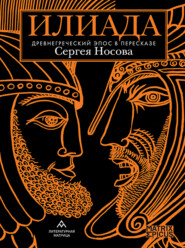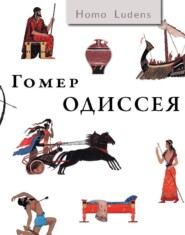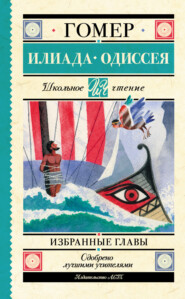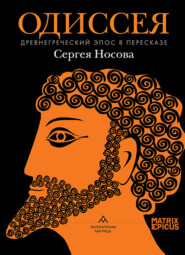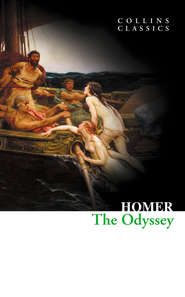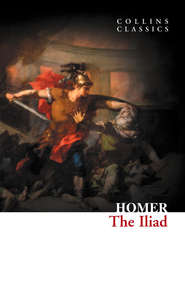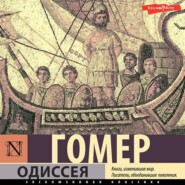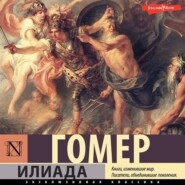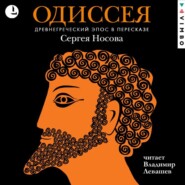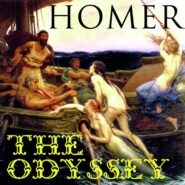По всем вопросам обращайтесь на: info@litportal.ru
(©) 2003-2024.
✖
The Iliad
Настройки чтения
Размер шрифта
Высота строк
Поля
So spake he, and Athene and Hera murmured, that were sitting by him and devising ills for the Trojans. Now Athene held her peace, and said not anything, for wrath at father Zeus, and fierce anger gat hold upon her; but Hera's heart contained not her anger, and she spake: "Most dread son of Kronos, what word is this thou hast said? Well know we, even we, that thy might is no wise puny; yet still have we pity for the Danaan spearmen, that now shall perish and fill up the measure of grievous fate."
And Zeus the cloud-gatherer answered and said: "At morn shalt thou behold most mighty Kronion, if thou wilt have it so, O Hera, ox-eyed queen, making yet more havoc of the vast army of Argive spearmen; for headlong Hector shall not refrain from battle till that Peleus' son fleet of foot have arisen beside the ships, that day when these shall fight amid the sterns in most grievous stress, around Patroklos fallen. Such is the doom of heaven. And for thine anger reck I not, not even though thou go to the nethermost bounds of earth and sea, where sit Iapetos and Kronos and have no joy in the beams of Hyperion the Sun-god, neither in any breeze, but deep Tartaros is round about them. Though thou shouldest wander till thou come even thither, yet reck I not of thy vexation, seeing there is no thing more unabashed than thou."
So said he, but white-armed Hera spake him no word. And the sun's bright light dropped into Ocean, drawing black night across Earth the grain-giver. Against the Trojans' will daylight departed, but welcome, thrice prayed for, to the Achaians came down the murky night.
Now glorious Hector made an assembly of the Trojans, taking them apart from the ships, beside the eddying river, in an open space where was found a spot clear of dead. And they came down from their chariots to the ground to hear the word that Hector, dear unto Zeus, proclaimed. He in his hand held his spear eleven cubits long; before his face gleamed the spearhead of bronze, and a ring of gold ran round about it. Thereon he leaned and spake to the Trojans, saying: "Hearken to me, Trojans and Dardanians and allies. I thought but now to make havoc of the ships and all the Achaians and depart back again to windy Ilios; but dusk came too soon, and that in chief hath now saved the Argives and the ships beside the beach of the sea. So let us now yield to black night, and make our supper ready; unyoke ye from the chariots your fair-maned horses, and set fodder beside them. And from the city bring kine and goodly sheep with speed; and provide you with honey-hearted wine, and corn from your houses, and gather much wood withal, that all night long until early-springing dawn we may burn many fires, and the gleam may reach to heaven; lest perchance even by night the flowing-haired Achaians strive to take flight over the broad back of the sea. Verily must they not embark upon their ships unvexed, at ease: but see ye that many a one of them have a wound to nurse even at home, being stricken with arrow or keen-pointed spear as he leapeth upon his ship; that so many another man may dread to wage dolorous war on the horse-taming men of Troy. And let the heralds dear to Zeus proclaim throughout the city that young maidens and old men of hoary heads camp round the city on the battlements builded of the gods; and let the women folk burn a great fire each in her hall; and let there be a sure watch set, lest an ambush enter the city when the host is absent. Howbeit for the night will we guard our own selves, and at morn by daybreak, arrayed in our armour, let us awake keen battle at the hollow ships. I will know whether Tydeus' son stalwart Diomedes shall thrust me from the ships back to the wall, or I shall lay him low with my spear and bear away his gory spoils. To-morrow shall he prove his valour, whether he can abide the onslaught of my spear. Would that I were immortal and ageless all my days and honoured like as Athene is honoured and Apollo, so surely as this day bringeth the Argives ill."
So Hector made harangue, and the Trojans clamoured applause. And they loosed their sweating steeds from the yoke, and tethered them with thongs, each man beside his chariot; and from the city they brought kine and goodly sheep with speed, and provided them with honey-hearted wine and corn from their houses, and gathered much wood withal. And from the plain the winds bare into heaven the sweet savour. But these with high hopes sate them all night along the highways of the battle, and their watchfires burned in multitude. Even as when in heaven the stars about the bright moon shine clear to see, when the air is windless, and all the peaks appear and the tall headlands and glades, and from heaven breaketh open the infinite air, and all stars are seen, and the shepherd's heart is glad; even in like multitude between the ships and the streams of Xanthos appeared the watchfires that the Trojans kindled in front of Ilios. A thousand fires burned in the plain and by the side of each sate fifty in the gleam of blazing fire. And the horses champed white barley and spelt, and standing by their chariots waited for the throned Dawn.
BOOK IX
Thus kept the Trojans watch; but the Achaians were holden of heaven-sent panic, handmaid of palsying fear, and all their best were stricken to the heart with grief intolerable. Like as two winds stir up the main, the home of fishes, even the north wind and the west wind that blow from Thrace, coming suddenly; and the dark billow straightway lifteth up its crest and casteth much tangle out along the sea; even so was the Achaians' spirit troubled in their breast.
But Atreides was stricken to the heart with sore grief, and went about bidding the clear-voiced heralds summon every man by name to the assembly, but not to shout aloud; and himself he toiled amid the foremost. So they sat sorrowful in assembly, and Agamemnon stood up weeping like unto a fountain of dark water that from a beetling cliff poureth down its black stream; even so with deep groaning he spake amid the Argives and said: "My friends, leaders and captains of the Argives, Zeus son of Kronos hath bound me with might in grievous blindness of soul; hard of heart is he, for that erewhile he promised and gave his pledge that not till I had laid waste well-walled Ilios should I depart, but now hath planned a cruel wile, and biddeth me return in dishonour to Argos with the loss of many of my folk. Such meseemeth is the good pleasure of most mighty Zeus, that hath laid low the heads of many cities, yea and shall lay low; for his is highest power. So come, even as I shall bid let us all obey; let us flee with our ships to our dear native land, for now shall we never take wide-wayed Troy."
So said he, and they all held their peace and kept silence. Long time were the sons of the Achaians voiceless for grief, but at the last Diomedes of the loud war-cry spake amid them and said: "Atreides: with thee first in thy folly will I contend, where it is just, O king, even in the assembly; be not thou wroth therefor. My valour didst thou blame in chief amid the Danaans, and saidst that I was no man of war but a coward; and all this know the Argives both young and old. But the son of crooked-counselling Kronos hath endowed thee but by halves; he granted thee to have the honour of the sceptre above all men, but valour he gave thee not, wherein is highest power. Sir, deemest thou that the sons of the Achaians are thus indeed cowards and weaklings as thou sayest? If thine own heart be set on departing, go thy way; the way is before thee, and thy ships stand beside the sea, even the great multitude that followed thee from Mykene. But all the other flowing-haired Achaians will tarry here until we lay waste Troy. Nay, let them too flee on their ships to their dear native land; yet will we twain, even I and Sthenelos, fight till we attain the goal of Ilios; for in God's name are we come."
So said he, and all the sons of the Achaians shouted aloud, applauding the saying of horse-taming Diomedes. Then knightly Nestor arose and said amid them: "Tydeides, in battle art thou passing mighty, and in council art thou best among thine equals in years; none of all the Achaians will make light of thy word nor gainsay it. Now let us yield to black night and make ready our meal; and let the sentinels bestow them severally along the deep-delved foss without the wall. This charge give I to the young men; and thou, Atreides, lead then the way, for thou art the most royal. Spread thou a feast for the councillors; that is thy place and seemly for thee. Thy huts are full of wine that the ships of the Achaians bring thee by day from Thrace across the wide sea; all entertainment is for thee, being king over many. In the gathering of many shalt thou listen to him that deviseth the most excellent counsel; sore need have all the Achaians of such as is good and prudent, because hard by the ships our foemen are burning their watch-fires in multitude; what man can rejoice thereat? This night shall either destroy or save the host."
So said he, and they gladly hearkened to him and obeyed. Forth sallied the sentinels in their harness. Seven were the captains of the sentinels, and with each went fivescore young men bearing their long spears in their hands; and they took post midway betwixt foss and wall, and kindled a fire and made ready each man his meal.
Then Atreides gathered the councillors of the Achaians, and led them to his hut, and spread before them an abundant feast. So they put forth their hands to the good cheer that lay before them. And when they had put away from them the desire of meat and drink, then the old man first began to weave his counsel, even Nestor, whose rede of old time was approved the best. He spake to them and said: "Most noble son of Atreus, Agamemnon king of men, in thy name will I end and with thy name begin, because thou art king over many hosts, and to thy hand Zeus hath entrusted sceptre and law, that thou mayest take counsel for thy folk. Thee therefore more than any it behoveth both to speak and hearken, and to accomplish what another than thou may say. No other man shall have a more excellent thought than this that I bear in mind from old time even until now, since the day when thou, O heaven-sprung king, didst go and take the damsel Briseis from angry Achilles' hut by no consent of ours. Nay, I right heartily dissuaded thee; but thou yieldedst to thy proud spirit, and dishonouredst a man of valour whom even the immortals honoured; for thou didst take and keepest from him his meed of valour. Still let us even now take thought how we may appease him and persuade him with gifts of friendship and kindly words."
And Agamemnon king of men answered and said to him: "Old sir, in no false wise hast thou accused my folly. Fool was I, I myself deny it not. Worth many hosts is he whom Zeus loveth in his heart, even as now he honoureth this man and destroyeth the host of the Achaians. But seeing I was a fool in that I yielded to my sorry passion, I will make amends and give a recompense beyond telling. In the midst of you all I will name the excellent gifts; seven tripods untouched of fire, and ten talents of gold and twenty gleaming caldrons, and twelve stalwart horses, winners in the race, that have taken prizes by their speed. No lackwealth were that man whose substance were as great as the prizes my whole-hooved steeds have borne me off. And seven women will I give, skilled in excellent handiwork, Lesbians whom I chose me from the spoils the day that he himself took stablished Lesbos, surpassing womankind in beauty. These will I give him, and with them shall be she whom erst I took from him, even the daughter of Briseus. All these things shall be set straightway before him; and if hereafter the gods grant us to lay waste the great city of Priam, then let him enter in when we Achaians be dividing the spoil, and lade his ship full of gold and bronze, and himself choose twenty Trojan women, the fairest that there be after Helen of Argos. And if we win to the richest of lands, even Achaian Argos, he shall be my son and I will hold him in like honour with Orestes, my stripling boy that is nurtured in all abundance. Three daughters are mine in my well-builded hall, Chrysothemis and Laodike and Iphianassa; let him take of them which he will, without gifts of wooing, to Peleus' house; and I will add a great dower such as no man ever yet gave with his daughter. And seven well-peopled cities will I give him, Kardamyle and Enope and grassy Hire and holy Pherai and Antheia deep in meads, and fair Aipeia and Pedasos land of vines. And all are nigh to the salt sea, on the uttermost border of sandy Pylos; therein dwell men abounding in flocks and kine, men that shall worship him like a god with gifts, and beneath his sway fulfil his prosperous ordinances. All this will I accomplish so he but cease from wrath. Let him yield; Hades I ween is not to be softened neither overcome, and therefore is he hatefullest of all gods to mortals. Yea, let him be ruled by me, inasmuch as I am more royal and avow me to be the elder in years."
Then knightly Nestor of Gerenia answered and said: "Most noble son of Atreus, Agamemnon king of men, now are these gifts not lightly to be esteemed that thou offerest king Achilles. Come therefore, let us speed forth picked men to go with all haste to the hut of Peleus' son Achilles. Lo now, whomsoever I appoint let them consent. First let Phoinix dear to Zeus lead the way, and after him great Aias and noble Odysseus; and for heralds let Odios and Eurybates be their companions. And now bring water for our hands, and bid keep holy silence, that we may pray unto Zeus the son of Kronos, if perchance he will have mercy upon us."
So said he, and spake words that were well-pleasing unto all. Forthwith the heralds poured water on their hands, and the young men crowned the bowls with drink and gave each man his portion after they had poured the libation in the cups. And when they had made libation and drunk as their heart desired, they issued forth from the hut of Agamemnon son of Atreus. And knightly Nestor of Gerenia gave them full charge, with many a glance to each, and chiefest to Odysseus, how they should essay to prevail on Peleus' noble son.
So the twain went along the shore of the loud-sounding sea, making instant prayer to the earth-embracer, the Shaker of the Earth, that they might with ease prevail on Aiakides' great heart. So they came to the huts and ships of the Myrmidons, and found their king taking his pleasure of a loud lyre, fair, of curious work, with a silver cross-bar upon it. Therein he was delighting his soul, and singing the glories of heroes. And over against him sate Patroklos alone in silence, watching till Aiakides should cease from singing. So the twain came forward, and noble Odysseus led the way, and they stood before his face; and Achilles sprang up amazed with the lyre in his hand, and left the seat where he was sitting, and in like manner Patroklos when he beheld the men arose. Then Achilles fleet of foot greeted them and said: "Welcome; verily ye are friends that are come – sore indeed is the need – even ye that are dearest of the Achaians to me even in my wrath."
So spake noble Achilles and led them forward, and made them sit on settles and carpets of purple; and anon he spake to Patroklos being near: "Bring forth a greater bowl, thou son of Menoitios; mingle stronger drink, and prepare each man a cup, for dearest of men are these that are under my roof."
Then put they forth their hands to the good cheer lying before them. And when they had put from them the desire of meat and drink, Aias nodded to Phoinix. But noble Odysseus marked it, and filled a cup with wine and pledged Achilles: "Hail, O Achilles! The fair feast lack we not either in the hut of Agamemnon son of Atreus neither now in thine; for feasting is there abundance to our heart's desire, but our thought is not for matters of the delicious feast; nay, we behold very sore destruction, thou fosterling of Zeus, and are afraid. Now is it in doubt whether we save the benched ships or behold them perish, if thou put not on thy might. Nigh unto ships and wall have the high-hearted Trojans and famed allies pitched their camp, and kindled many fires throughout their host, and ween that they shall no more be withheld but will fall on our black ships. And Zeus son of Kronos sheweth them signs upon the right by lightning, and Hector greatly exulteth in his might and rageth furiously, trusting in Zeus, and recketh not of god nor man, for mighty madness hath possessed him. He prayeth bright Dawn to shine forth with all speed, for he bath passed his word to smite off from the ships the ensigns' tops, and to fire the hulls with devouring flame, and hard thereby to make havoc of the Achaians confounded by the smoke. Therefore am I sore afraid in my heart lest the gods fulfil his boastings, and it be fated for us to perish here in Troy-land, far from Argos pasture-land of horses. Up then! if thou art minded even at the last to save the failing sons of the Achaians from the war-din of the Trojans. Eschew thy grievous wrath; Agamemnon offereth thee worthy gifts, so thou wilt cease from anger. Lo now, hearken thou to me, and I will tell thee all the gifts that in his hut Agamemnon promised thee. But if Agamemnon be too hateful to thy heart, both he and his gifts, yet have thou pity on all the Achaians that faint throughout the host; these shall honour thee as a god, for verily thou wilt earn exceeding great glory at their hands. Yea now mightest thou slay Hector, for he would come very near thee in his deadly madness, because he deemeth that there is no man like unto him among the Danaans that the ships brought hither."
And Achilles fleet of foot answered and said unto him: "Heaven-sprung son of Laertes, Odysseus of many wiles, in openness must I now declare unto you my saying, even as I am minded and as the fulfilment thereof shall be, that ye may not sit before me and coax this way and that. For hateful to me even as the gates of hell is he that hideth one thing in his heart and uttereth another: but I will speak what meseemeth best. Not me, I ween, shall Agamemnon son of Atreus persuade, nor the other Danaans, seeing we were to have no thank for battling with the foemen ever without respite. He that abideth at home hath equal share with him that fighteth his best, and in like honour are held both the coward and the brave; death cometh alike to the untoiling and to him that hath toiled long. Neither have I any profit for that I endured tribulation of soul, ever staking my life in fight. Even as a hen bringeth her unfledged chickens each morsel as she winneth it, and with herself it goeth hard, even so I was wont to watch out many a sleepless night and pass through many bloody days of battle, warring with folk for their women's sake. Twelve cities of men have I laid waste from ship-board, and from land eleven, throughout deep-soiled Troy-land; out of all these took I many goodly treasures and would bring and give them all to Agamemnon son of Atreus, and he staying behind amid the fleet ships would take them and portion out some few but keep the most. Now some he gave to be meeds of honour to the princes and the kings, and theirs are left untouched; only from me of all the Achaians took he my darling lady and keepeth her. But why must the Argives make war on the Trojans? why hath Atreides gathered his host and led them hither? is it not for lovely-haired Helen's sake? Do then the sons of Atreus alone of mortal men love their wives? surely whatsoever man is good and sound of mind loveth his own and cherisheth her, even as I too loved mine with all my heart, though but the captive of my spear. But now that he hath taken my meed of honour from mine arms and hath deceived me, let him not tempt me that know him full well; he shall not prevail. Nay, Odysseus, let him take counsel with thee and all the princes to ward from the ships the consuming fire. Verily without mine aid he hath wrought many things, and built a wall and dug a foss about it wide and deep, and set a palisade therein; yet even so can he not stay murderous Hector's might. But so long as I was fighting amid the Achaians, Hector had no mind to array his battle far from the wall, but scarce came unto the Skaian gates and to the oak-tree; there once he awaited me alone and scarce escaped my onset. But now, seeing I have no mind to fight with noble Hector, I will to-morrow do sacrifice to Zeus and all the gods, and store well my ships when I have launched them on the salt sea – then shalt thou see, if thou wilt and hast any care therefor, my ships sailing at break of day over Hellespont, the fishes' home, and my men right eager at the oar; and if the great Shaker of the Earth grant me good journey, on the third day should I reach deep-soiled Phthia. There are my great possessions that I left when I came hither to my hurt; and yet more gold and ruddy bronze shall I bring from hence, and fair-girdled women and grey iron, all at least that were mine by lot; only my meed of honour hath he that gave it me taken back in his despitefulness, even lord Agamemnon son of Atreus. To him declare ye everything even as I charge you, openly, that all the Achaians likewise may have indignation, if haply he hopeth to beguile yet some other Danaan, for that he is ever clothed in shamelessness. Verily not in my face would he dare to look, though he have the front of a dog. Neither will I devise counsel with him nor any enterprise, for utterly he hath deceived me and done wickedly; but never again shall he beguile me with fair speech – let this suffice him. Let him begone in peace; Zeus the lord of counsel hath taken away his wits. Hateful to me are his gifts, and I hold him at a straw's worth. Not even if he gave me ten times, yea twenty, all that now is his, and all that may come to him otherwhence, even all the revenue of Orchomenos or Egyptian Thebes where the treasure-houses are stored fullest – Thebes of the hundred gates, whence sally forth two hundred warriors through each with horses and chariots – nay, nor gifts in number as sand or dust; not even so shall Agamemnon persuade my soul till he have paid me back all the bitter despite. And the daughter of Agamemnon son of Atreus will I not wed, not were she rival of golden Aphrodite for fairness and for handiwork matched bright-eyed Athene – not even then will I wed her; let him choose him of the Achaians another that is his peer and is more royal than I. For if the gods indeed preserve me and I come unto my home, then will Peleus himself seek me a wife. Many Achaian maidens are there throughout Hellas and Phthia, daughters of princes that ward their cities; whomsoever of these I wish will I make my dear lady. Very often was my high soul moved to take me there a wedded wife, a help meet for me, and have joy of the possessions that the old man Peleus possesseth. For not of like worth with life hold I even all the wealth that men say was possessed of the well-peopled city of Ilios in days of peace gone by, before the sons of the Achaians came; neither all the treasure that the stone threshold of the archer Phoebus Apollo encompasseth in rocky Pytho. For kine and goodly flocks are to be had for the harrying, and tripods and chestnut horses for the purchasing; but to bring back man's life neither harrying nor earning availeth when once it hath passed the barrier of his lips. For thus my goddess mother telleth me, Thetis the silver-footed, that twain fates are bearing me to the issue of death. If I abide here and besiege the Trojans' city, then my returning home is taken from me, but my fame shall be imperishable; but if I go home to my dear native land, my high fame is taken from me, but my life shall endure long while, neither shall the issue of death soon reach me. Moreover I would counsel you all to set sail homeward, seeing ye shall never reach your goal of steep Ilios; of a surety far-seeing Zeus holdeth his hand over her and her folk are of good courage. So go your way and tell my answer to the princes of the Achaians, even as is the office of elders, that they may devise in their hearts some other better counsel, such as shall save them their ships and the host of the Achaians amid the hollow ships: since this counsel availeth them naught that they have now devised, by reason of my fierce wrath. But let Phoinix now abide with us and lay him to rest, that he may follow with me on my ships to our dear native land to-morrow, if he will; for I will not take him perforce."
So spake he, and they all held their peace and were still, and marvelled at his saying; for he denied them very vehemently. But at the last spake to them the old knight Phoinix, bursting into tears, because he was sore afraid for the ships of the Achaians: "If indeed thou ponderest departure in thy heart, glorious Achilles, and hast no mind at all to save the fleet ships from consuming fire, because that wrath bath entered into thy heart; how can I be left of thee, dear son, alone thereafter? To thee did the old knight Peleus send me the day he sent thee to Agamemnon forth from Phthia, a stripling yet unskilled in equal war and in debate wherein men wax pre-eminent. Therefore sent he me to teach thee all these things, to be both a speaker of words and a doer of deeds. Yea, I reared thee to this greatness, thou godlike Achilles, with my heart's love; for with none other wouldest thou go unto the feast, neither take meat in the hall, till that I had set thee upon my knees and stayed thee with the savoury morsel cut first for thee, and put the wine-cup to thy lips. Oft hast thou stained the doublet on my breast with sputtering of wine in thy sorry helplessness. Thus I suffered much with thee, and much I toiled, being mindful that the gods in nowise created any issue of my body; but I made thee my son, thou godlike Achilles, that thou mayest yet save me from grievous destruction. Therefore, Achilles, rule thy high spirit; neither beseemeth it thee to have a ruthless heart. Nay, even the very gods can bend, and theirs withal is loftier majesty and honour and might. Nay, come for the gifts; the Achaians shall honour thee even as a god. But if without gifts thou enter into battle the bane of men, thou wilt not be held in like honour, even though thou avert the fray."
And Achilles fleet of foot made answer and said to him: "Phoinix my father, thou old man fosterling of Zeus, such honour need I in no wise; for I deem that I have been honoured by the judgment of Zeus, which shall abide upon me amid my beaked ships as long as breath tarrieth in my body and my limbs are strong. Moreover I will say this thing to thee and lay thou it to thine heart; trouble not my soul by weeping and lamentation, to do the pleasure of warrior Atreides; neither beseemeth it thee to cherish him, lest thou be hated of me that cherish thee. It were good that thou with me shouldest vex him that vexeth me. Be thou king even as I, and share my sway by halves, but these shall bear my message. So tarry thou here and lay thee to rest in a soft bed, and with break of day will we consider whether to depart unto our own, or to abide."
He spake, and nodded his brow in silence unto Patroklos to spread for Phoinix a thick couch, that the others might bethink them to depart from the hut with speed. Then spake to them Aias, Telamon's godlike son, and said: "Heaven-sprung son of Laertes, Odysseus of many wiles, let us go hence; for methinks the purpose of our charge will not by this journey be accomplished; and we must tell the news, though it be no wise good, with all speed unto the Danaans, that now sit awaiting. But Achilles hath wrought his proud soul to fury within him – stubborn man, that recketh naught of his comrades' love, wherein we worshipped him beyond all men amid the ships – unmerciful! Yet doth a man accept recompense of his brother's murderer or for his dead son; and so the man-slayer for a great price abideth in his own land, and the kinsman's heart is appeased, and his proud soul, when he hath taken the recompense. But for thee, the gods have put within thy breast a spirit implacable and evil, by reason of one single damsel. And now we offer thee seven damsels, far best of all, and many other gifts besides; entertain thou then a kindly spirit, and have respect unto thine home; because we are guests of thy roof, sent of the multitude of Danaans, and we would fain be nearest to thee and dearest beyond all other Achaians, as many as there be."
And Achilles fleet of foot made answer and said to him: "Aias sprung of Zeus, thou son of Telamon, prince of the folk, thou seemest to speak all this almost after mine own mind; but my heart swelleth with wrath as oft as I bethink me of those things, how Atreides entreated me arrogantly among the Argives, as though I were some worthless sojourner. But go ye and declare my message; I will not take thought of bloody war until that wise Priam's son, noble Hector, come to the Myrmidons' huts and ships, slaying the Argives, and smirch the ships with fire. But about mine hut and black ship I ween that Hector, though he be very eager for battle, shall be refrained."
So said he, and they took each man a two-handled cup, and made libation and went back along the line of ships; and Odysseus led the way. And Patroklos bade his fellows and handmaidens spread with all speed a thick couch for Phoinix; and they obeyed and spread a couch as he ordained, fleeces and rugs and fine flock of linen. Then the old man laid him down and tarried for bright Dawn.
Now when those were come unto Atreides' huts, the sons of the Achaians stood up on this side and on that, and pledged them in cups of gold, and questioned them; and Agamemnon king of men asked them first: "Come now, tell me, Odysseus full of praise, thou great glory of the Achaians; will he save the ships from consuming fire, or said he nay, and hath wrath yet hold of his proud spirit?"
And steadfast goodly Odysseus answered him: "Most noble son of Atreus, Agamemnon king of men, he yonder hath no mind to quench his wrath, but is yet more filled of fury, and spurneth thee and thy gifts. He biddeth thee take counsel for thyself amid the Argives, how to save the ships and folk of the Achaians. And for himself he threateneth that at break of day he will launch upon the sea his trim well-benched ships. Moreover he said that he would counsel all to sail for home, because ye now shall never reach your goal of steep Ilios; surely far-seeing Zeus holdeth his hand over her and her folk are of good courage. Even so said he, and here are also these to tell the tale that were my companions, Aias and the two heralds, both men discreet. But the old man Phoinix laid him there to rest, even as Achilles bade him, that he may follow with him on his ships to his dear native land to-morrow, if he will; for he will not take him perforce."
So said he, and they all held their peace and were still, marvelling at his saying, for he harangued very vehemently. Long were the sons of the Achaians voiceless for grief, but at the last Diomedes of the loud war-cry spake amid them: "Most noble son of Atreus, Agamemnon king of men, would thou hadst never besought Peleus' glorious son with offer of gifts innumerable; proud is he at any time, but now hast thou yet far more encouraged him in his haughtiness. Howbeit we will let him bide, whether he go or tarry; hereafter he shall fight, whenever his heart within him biddeth and god arouseth him. Come now, even as I shall say let us all obey. Go ye now to rest, full to your hearts' desire of meat and wine, wherein courage is and strength; but when fair rosy-fingered Dawn appeareth, array thou with all speed before the ships thy folk and horsemen, and urge them on; and fight thyself amid the foremost."
So said he, and all the princes gave assent, applauding the saying of Diomedes tamer of horses. And then they made libation and went every man to his hut, and there laid them to rest and took the boon of sleep.
BOOK X
Now beside the ships the other leaders of the whole Achaian host were sleeping all night long, by soft Sleep overcome, but Agamemnon son of Atreus, shepherd of the host, sweet Sleep held not, so many things he debated in his mind. And even as when the lord of fair-tressed Hera lighteneth, fashioning either a mighty rain unspeakable, or hail, or snow, when the flakes sprinkle all the ploughed lands, or fashioning perchance the wide mouth of bitter war, even so oft in his breast groaned Agamemnon, from the very deep of his heart, and his spirits trembled within him. And whensoever he looked toward that Trojan plain, he marvelled at the many fires that blazed in front of Ilios, and at the sound of flutes and pipes, and the noise of men; but whensoever to the ships he glanced and the host of the Achaians, then rent he many a lock clean forth from his head, to Zeus that is above, and greatly groaned his noble heart.
And this in his soul seemed to him the best counsel, to go first of all to Nestor son of Neleus, if perchance he might contrive with him some right device that should be for the warding off of evil from all the Danaans.
Then he rose, and did on his doublet about his breast, and beneath his shining feet he bound on fair sandals, and thereafter clad him in the tawny skin of a lion fiery and great, a skin that reached to the feet, and he grasped his spear.
And even in like wise did trembling fear take hold on Menelaos, (for neither on his eyelids did Sleep settle down,) lest somewhat should befall the Argives, who verily for his sake over wide waters were come to Troy-land, with fierce war in their thoughts.
With a dappled pard's akin first he covered his broad shoulders, and he raised and set on his head a casque of bronze, and took a spear in his strong hand. Then went he on his way to rouse his brother, that mightily ruled over all the Argives, and as a god was honoured by the people. Him found he harnessing his goodly gear about his shoulders, by the stern of the ship, and glad to his brother was his coming. Then Menelaos of the loud war-cry first accosted him: "Wherefore thus, dear brother, art thou arming? Wilt thou speed forth any of thy comrades to spy on the Trojans? Nay, terribly I fear lest none should undertake for thee this deed, even to go and spy out the foeman alone through the ambrosial night; needs must he be a man right hardy of heart."
Then the lord Agamemnon answered him and spake: "Need of good counsel have I and thou, Menelaos fosterling of Zeus, of counsel that will help and save the Argives and the ships, since the heart of Zeus hath turned again. Surely on the sacrifices of Hector hath he set his heart rather than on ours. For never did I see, nor heard any tell, that one man devised so many terrible deeds in one day, as Hector, dear to Zeus, hath wrought on the sons of the Achaians, unaided; though no dear son of a goddess is he, nor of a god. He hath done deeds that methinks will be a sorrow to the Argives, lasting and long, such evils hath he devised against the Achaians. But go now, run swiftly by the ships, and summon Aias and Idomeneus, but I will betake me to noble Nestor, and bid him arise, if perchance he will be fain to go to the sacred company of the sentinels and lay on them his command. For to him above others would they listen, for his own son is chief among the sentinels, he and the brother in arms of Idomeneus, even Meriones, for to them above all we entrusted this charge."
Then Menelaos of the loud war-cry answered him: "How meanest thou this word wherewith thou dost command and exhort me? Am I to abide there with them, waiting till thou comest, or run back again to thee when I have well delivered to them thy commandment?"
Then the king of men, Agamemnon, answered him again: "There do thou abide lest we miss each other as we go, for many are the paths through the camp. But call aloud, wheresoever thou goest, and bid men awake, naming each man by his lineage, and his father's name, and giving all their dues of honour, nor be thou proud of heart. Nay rather let us ourselves be labouring, for even thus did Zeus from our very birth dispense to us the heaviness of toil."
So he spake, and sent his brother away, having clearly laid on him his commandment. Then went he himself after Nestor, the shepherd of the host, whom he found by his hut and black ship, in his soft bed: beside him lay his arms, a shield, and two spears, and a shining helmet. Beside him lay his glittering girdle wherewith the old man was wont to gird himself when he harnessed him for war, the bane of men, and led on the host, for he yielded not to grievous old age. Then he raised him on his elbow, lifting his head, and spake to the son of Atreus, inquiring of him with this word: "Who art thou that farest alone by the ships, through the camp in the dark night, when other mortals are sleeping? Seekest thou one of thy mules, or of thy comrades? speak, and come not silently upon me. What need hast thou?"
Then the king of men, Agamemnon, answered him: "O Nestor, son of Neleus, great glory of the Achaians, thou shalt know Agamemnon, son of Atreus, whom above all men Zeus hath planted for ever among labours, while my breath abides within my breast, and my knees move. I wander thus, for that sweet sleep rests not on mine eyes, but war is my care, and the troubles of the Achaians. Yea, greatly I fear for the sake of the Danaans, nor is my heart firm, but I am tossed to and fro, and my heart is leaping from my breast, and my good knees tremble beneath me. But if thou wilt do aught, since neither on thee cometh sleep, let us go thither to the sentinels, that we may see them, lest they be fordone with toil, and so are slumbering, and have quite forgotten to keep watch. And hostile men camp hard by, nor know we at all but that they are keen to do battle in the night."
Then knightly Nestor of Gerenia answered him: "Verily will I follow after thee, but let us also rouse others again, both the son of Tydeus, spearman renowned, and Odysseus, and swift Aias, and the strong son of Phyleus. But well it would be if one were to go and call those also, the godlike Aias, and Idomeneus the prince; for their ships are furthest of all, and nowise close at hand. But Menelaos will I blame, dear as he is and worshipful, yea, even if thou be angry with me, nor will I hide my thought, for that he slumbereth, and to thee alone hath left the toil; now should he be toiling among all the chiefs and beseeching them, for need no longer tolerable is coming upon us."
And the king of men, Agamemnon, answered him again: "Old man, another day I even bid thee blame him, for often is he slack, and willeth not to labour, yielding neither to unreadiness nor heedlessness of heart, but looking toward me, and expecting mine instance. But now he awoke far before me, and came to me, and him I sent forward to call those concerning whom thou inquirest. But let us be gone, and them shall we find before the gates, among the sentinels, for there I bade them gather."
Then knightly Nestor of Gerenia answered him: "So will none of the Argives be wroth with him or disobey him, when soever he doth urge any one, and give him his commands."
So spake he, and did on his doublet about his breast, and beneath his bright feet he bound goodly shoon, and all around him buckled a purple cloak, with double folds and wide, and thick down all over it.
And he took a strong spear, pointed with sharp bronze, and he went among the ships of the mail-clad Achaians. Then Odysseus first, the peer of Zeus in counsel, did knightly Gerenian Nestor arouse out of sleep, with his voice, and quickly the cry came all about his heart, and he came forth from the hut and spake to them saying: "Wherefore thus among the ships and through the camp do ye wander alone, in the ambrosial night; what so great need cometh upon you?"
Then knightly Nestor of Gerenia answered him: "Laertes' son, be not wroth, for great trouble besetteth the Achaians. Nay follow, that we may arouse others too, even all that it behoveth to take counsel, whether we should fly, or fight."
So spake he, and Odysseus of the many counsels came to the hut, and cast a shield about his shoulders, and went after them.
And they went to seek Diomedes, son of Tydeus, and him they found outside his hut, with his arms, and around him his comrades were sleeping with their shields beneath their heads, but their spears were driven into the ground erect on the spikes of the butts, and afar shone the bronze, like the lightning of father Zeus. Now that hero was asleep, and under him was strewn the hide of an ox of the field, but beneath his head was stretched a shining carpet. Beside him went and stood knightly Nestor of Gerenia and stirred him with a touch of his foot, and aroused him, chiding him to his face, saying: "Wake, son of Tydeus, why all night long dost thou sleep? Knowest thou not that the Trojans on the high place of the plain are camped near the ships, and but a little space holdeth them apart?"
So spake he, and Diomedes sprang swiftly up out of sleep, and spake to him winged words: "Hard art thou, old man, and from toil thou never ceasest. Now are there not other younger sons of the Achaians, who might rouse when there is need each of the kings, going all around the host? but thou, old man, art indomitable."
And him knightly Nestor of Gerenia answered again, "Nay verily, my son, all this that thou sayest is according unto right. Noble sons have I, and there be many of the host, of whom each man might go and call the others. But a right great need hath assailed the Achaians. For now to all of us it standeth on a razor's edge, either pitiful ruin for the Achaians, or life. But come now, if indeed thou dost pity me, rouse swift Aias, and the son of Phyleus, for thou art younger than I."
So spake he, and Diomedes cast round his shoulders the skin of a great fiery lion, that reached to his feet, and he grasped his spear, and started on his way, and roused the others from their place and led them on.






